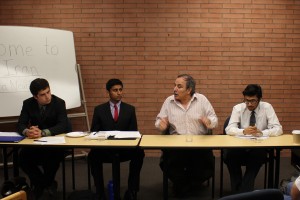Student association hosts panel on US-Iran relations
On Thursday, the USC International Relations Undergraduate Association hosted a panel discussing the United States’ renewed engagement with Iran, “US-Iran Relations: Into a New Era,” featuring Muhammad Sahimi, chair of the National Iranian Oil Company and professor of chemical engineering and materials science at the Viterbi School of Engineering.

Tension · Panelist Muhammad Sahimi (second to right), discussed the tenuous relationship between the United States and Iran. – Kevin Fohrer | Daily Trojan
The event was hosted in conjunction with USC Model United Nations and the Jesse M. Unruh Institute of Politics and moderated by student Luke Phillips of MUNSC. Other panelists included USC Dornsife College of Letters, Arts and Sciences undergraduate students Shikhar Gupta and Mustafa Zaffer, both of MUN.
Sahimi began the discussion with a background on the tenuous relationship between the United States and Iran over the issue of Iran’s nuclear program. He stated that though Iran’s nuclear program was initially supported by the United States under President Dwight Eisenhower’s “Atoms for Peace” program, the new Iranian government ended nuclear activities after the 1979 Iranian Revolution.
Sahimi gave a personal anecdote about how the politics of the time affected his own studies in the United States.
“I came actually to this country with a promised scholarship from the Atomic Energy Organization of Iran,” Sahimi said. “I came here to study to get my Ph.D. and go back to work for the Atomic Energy Organization of Iran. But when I came to this country, it was fall of 1978, and that was just when the Iranian Revolution was gathering steam. So in February of 1979, the Iranian government overthrew the regime of the Shah and I never got my scholarship.”
Sahimi shared a candid view on the sometimes-controversial rhetoric from current Iranian leaders.
“Mahmoud Ahmadinejad [the former president of Iran] was a radical,” Sahimi said. “He started using very fierce and hot rhetoric against the West, and talked about— stupidly, I must say — Israel, and he denied historical facts like the Holocaust.”
Phillips asked Sahimi about the international community’s assertions that Iran intends to develop nuclear weapons. Iran has claimed that its program is for peaceful purposes only.
“These are not things that one can talk about with 100 percent certainty,” Sahimi said. “If someone put a gun to my head and said, ‘Would you guarantee with 100 percent certainty that Iran never used its nuclear technology to research or develop nuclear weapons?’ I would say, ‘Pull the trigger,’ because I cannot guarantee it.”
Sahimi maintained, however, that though Iran might have had a nuclear weapons program in the past, current reports suggest that there is no proof of such a program in place.
“All evidence suggests that Iran actually never took any practical steps to develop nuclear weapons,” he said.
The panelists suggested that the nuclear issue may be tied to hegemony in the Middle East.
“I think other countries around Iran have been voicing their opinion, to the U.S. especially, that if Iran is capable towards going to a nuclear bomb, would that not start an arms race? If Iran needs a bomb, it’s in the case of deterrents to Israel,” Zaffer said.
Gupta agreed and stated that Iran and Israel were engaged in power politics within the region.
“Iran has a lot to offer with such a young and educated populace with vast natural resources,” Gupta said.
He also believed that economic issues played a role in the Iran-Israel relationship.
“Should Iran become a country that has gotten western legitimacy, then that would be a lot for Israel to worry about,” Gupta said. “Because with all that present in Iran, that would mean the U.S. would start investing money [in] Iran and that would mean money pulled away from the large amount of investment in Israel.”
Andre Gray, a freshman majoring in economics (mathematics) and international relations, was interested in potential economic effects in the region.
“Something I found particularly interesting was the discussion on economic stability of the Middle East and especially the contributions of countries like Saudi Arabia who are worried about bettering relations between Iran and the U.S., and how that could potentially lead to more competition in terms of natural resources like oil in the marketplace,” Gray said.
Jack Cannice, a sophomore majoring in philosophy, politics and law, stated that he was doubtful about some of the issues discussed.
“It was interesting how the professor took his viewpoint that there wasn’t really any credibility to the nuclear threat,” Cannice said. “I’m not entirely sure that’s true, because I did read in my IR class last year that [the Iranian government] had more nuclear centrifuges developed that they could ever possibly want for just clean energy. I didn’t agree with everything, but it was enlightening.”

